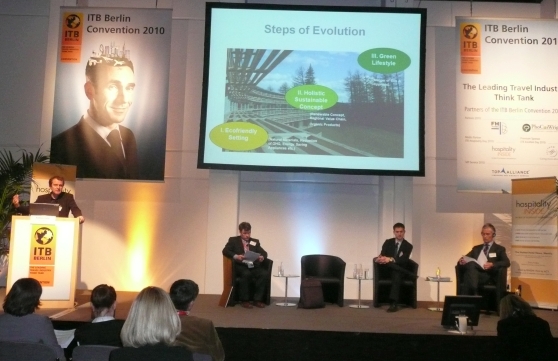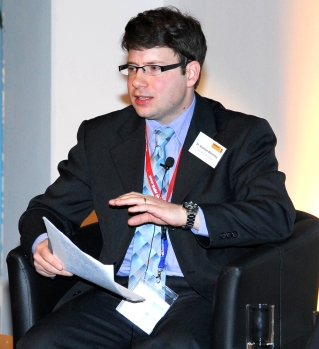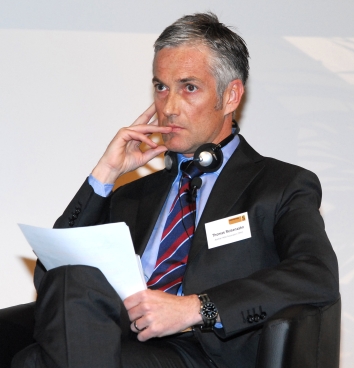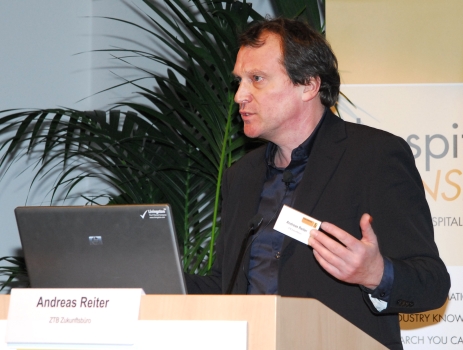ITB Hospitality Day: Talking Climate - Panelists put it into its context
 |
|
| Andreas Reiter presents positive examples at the climate panel. |
Berlin (April 9, 2010). The direct link between the tourism industry and climate change is clear. However before looking at the ways in which hotels can mitigate or adapt to this change as introduced by moderator Dr Andreas Walmsley, Course Leader Responsible Tourism and Hospitality at the International Centre for Responsible Tourism at Leeds Metropolitan University, it is useful to put the effect of tourism on climate change into context. The discussion "Climate Change: How do Hotels have to Adapt their Products?" touched different topics, e.g. the direct effects, winners and losers, labelling and transparency.
Estimates from the UNWTO suggest that tourism in its broadest sense is responsible for about 5% of global CO2 emissions. Some 75% of that is accounted for by transport (air travel being the main contributor with 40% of the total) and about 20% from the lodging sector. There are no grounds for complacency but, with responsibility for just 1% of the problem, the hotel industry should not beat itself up too much.
Direct Effects: There are of course the direct effects of climate change on, for example, the changing weather conditions at a destination or in the case of ski resorts the increasingly obvious receding of snow heights. “Climate change is affecting things permanently,” explained Philipp Ehmer, economist at Deutsche Bank Research and responsible for the services sector. Andreas Reiter of the Viennese-based research institution ZTB Zukunftsbuero sees, with the current resetting of the operations of market economies, that “sustainable growth is the only long term solution instead of quarterly ‘quickies’ (to please shareholders).”
 |
|
| Moderator Dr Andreas Walsmley. |
Holistic Approach: Reiter argues for a holistic approach to the issue of “green lifestyle hotels”. A fundamentally renewable concept in which the ecological footprint of the tourist industry could be minimized and the moral balance sheet of both the hotelier and guest maximized. His exemplar properties included Bay of Fire Lodge, Tasmania (rainwater collection, grey water treatment systems, composting toilets, solar power) and the proposed North Slope Hotel in the Rocky Mountains by Michael Jantzen (solar and wind energy, passive solar heating, rainwater & winter snow-melt collection).
Winners & Losers: Research conducted by Deutsche Bank measured and ranked countries not only on the direct effects of climate change such as temperatures, sea levels, precipitation patterns and so on, but also the on the ability of countries to deal with the resultant international and national flows of tourism and their ability to adapt to the changing conditions.
The ranking showed some obvious trends such as the more extreme weather conditions of southern and eastern Mediterranean countries meaning they would be expected to lose out in a migration of tourists to milder northwestern European climes over the next twenty years. Certain countries such as Austria are already adapting to the unreliability of their snowfalls by the introduction of snow making equipment but more realistically, by the adoption of activities other than skiing, i.e. wellness, and catering for a longer summer season.
 |
|
| Thomas Reisenzahn. |
More worryingly is the notion that those countries with a high economic dependence on tourism are often those most vulnerable to the climate change, e.g. the islands of the Indian Ocean. Together these factors have been plotted on the chart below that shows clear winners and losers. For reasons of scale the results for Mauritius, the Seychelles and Maldives, who all have a particularly high proportion of GDP from tourism, are not on the graphic; these are the losers who stand to suffer the most.
Consumer Demand: Debating whether or not the hotel industry is really engaged in the sustainable movement, Thomas Reisenzahn, Secretary-General of the Austrian Hotel Association, saw as a stumbling block, the legacy of old hotels that are very inefficient. Nevertheless, Ehmer saw an overwhelming “consumer demand for sustainability which cannot be forced and just needs some time.” Reiter agreed to an “increasing ecological sensibility of lead consumers” and that whilst there are some pioneers such as the Boutiquehotel Stadthalle in Vienna, the first hotel in the city to be awarded the EU eco-label and is striving towards a “zero energy balance”, more are needed.
Labelling: The labeling issue got its usual airing. Ehmer stated that it would be “ideal to have one standard but to achieve this in Europe would be very difficult.” Reisenzahn argued alternatively that to have “one standard would be to reduce things to the lowest common denominator and therefore (he believes) in regional labels.” Reisenzahn was also skeptical about environmental certification explaining that it was often used “to score extra points” when it came to market differentiation.
 |
|
| Andreas Reiter. |
Transparency: Certification or not, the days of luxury hotels saying they are making environmentally efficient improvements in their back of house which will not impact on the guest experience are probably numbered. Hotels will be more likely to follow the lead of resort specialists Six Senses, who adopt a transparent approach towards their sustainable efforts. Their hotels open up their back of house to allow guests to see the measures taken by the hotel to reduce the environmental impact of each guest’s stay. Whether or not guests will want to see the biomass boiler or grey water recycling is another matter but the choice is there and not hidden. Similar to the short-lived attempt to hide sprinkler and smoke detection equipment, where now guests are reassured by their presence, so too will be the same with ecological measures.
Convenient Truth: A key driver in the change towards a more sustainable future for the hotel industry comes from a desire by operators to look after their own profits. Rising energy costs have forced hoteliers to seek more efficient methods. Reiter quoted the Austrian Chamber of Economics (WKO) figures that show that energy costs (in Euros) for a four-star hotel in Austria increased by 85% between 2005 and 2008. It is a convenient truth that ecological aims also happen to be economic aims.
In considering the effect of the recession on plans of hotel operators regarding sustainable practices, a switch from “values to value” is to be expected as discretionary funds become more inaccessible. Ehmer expects that whilst the big hotels will be able to continue the smaller players will have difficulty making the large investments necessary. And this extends to the smaller, less developed nations, Ehmer’s “losers”. Of the reduction in VAT for Germany’s hoteliers, Reiter hoped that the ‘windfall’ would be used for investments into longer-term, sustainable programs.
 |
|
| Philipp Ehmer. |
Reiter also sees a need for hoteliers to develop a regional value chain involving local suppliers. Reisenzahn saw no issues at all in getting suppliers to “go environmentally friendly” such was the pressure from the end consumer. However he also believed that the end consumer, the guest, needs to be “trained” as the holiday experience remains very much a time of luxury and excess.
Conclusions: The impact of climate change upon tourism is already apparent. Destination choices have always been made with local weather conditions in mind and this will not change. The problem lies in those places where alternative forms of economic growth are not readily available. Hotels can do more than their fair share of at least informing the travelling public of the easy little steps (of Al Gore’s “Inconvenient Truth”) such as waste separation, soap dispensers, etc., in which each one of us can make a positive contribution to slowing climate change and therefore helping those less able to help themselves. / Guy Dittrich
March 26, 2010 Sit down and think - ITB Hospitality Day: Innovation panel pleading a mental restart
To print this article you have to be registered and logged in for newsletter, visitor or subscription.





